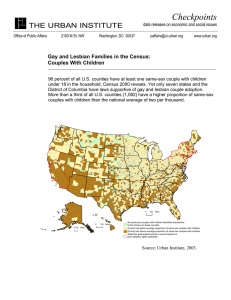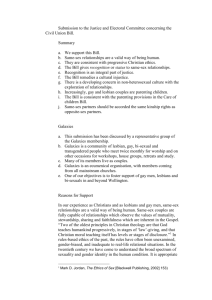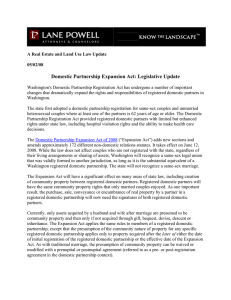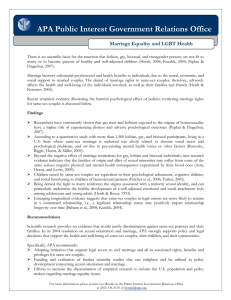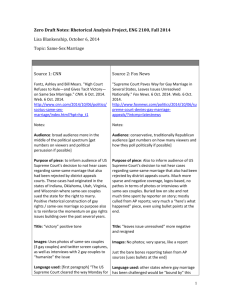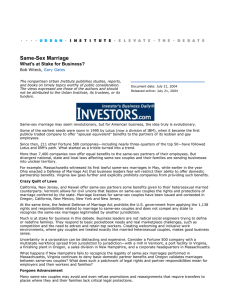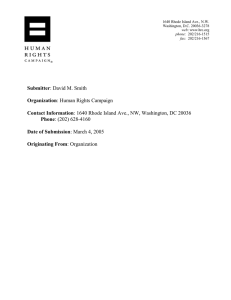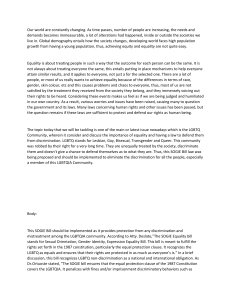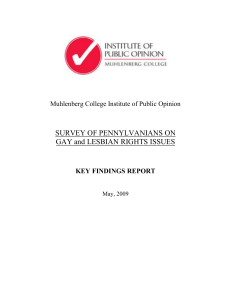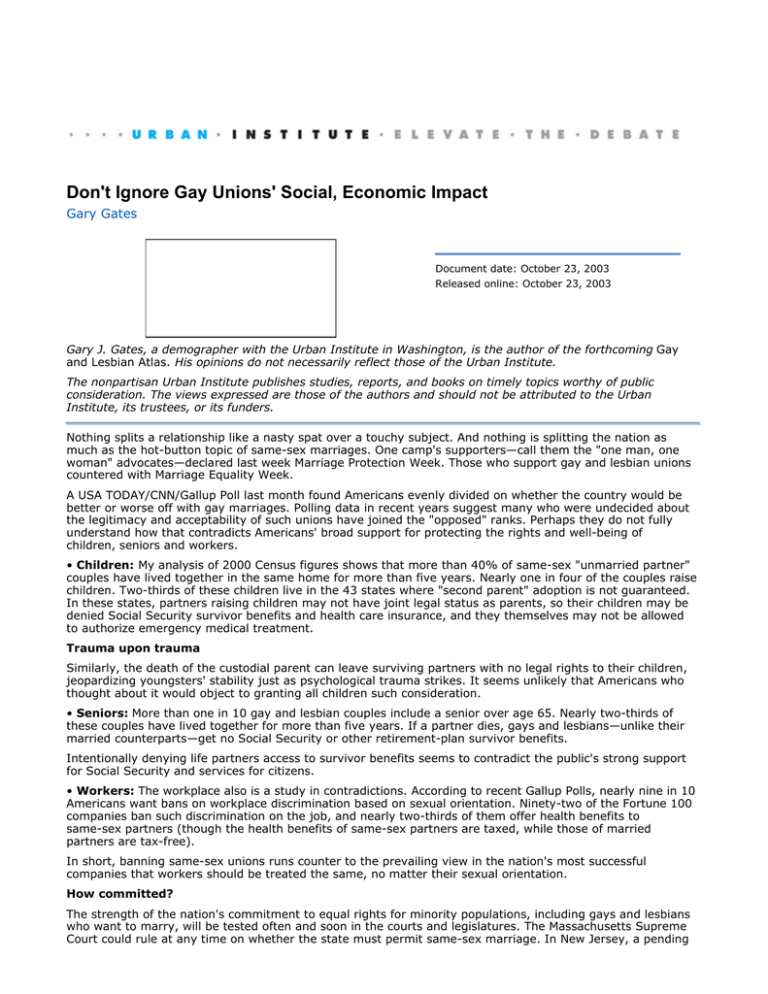
Don't Ignore Gay Unions' Social, Economic Impact
Gary Gates
Document date: October 23, 2003
Released online: October 23, 2003
Gary J. Gates, a demographer with the Urban Institute in Washington, is the author of the forthcoming Gay
and Lesbian Atlas. His opinions do not necessarily reflect those of the Urban Institute.
The nonpartisan Urban Institute publishes studies, reports, and books on timely topics worthy of public
consideration. The views expressed are those of the authors and should not be attributed to the Urban
Institute, its trustees, or its funders.
Nothing splits a relationship like a nasty spat over a touchy subject. And nothing is splitting the nation as
much as the hot-button topic of same-sex marriages. One camp's supporters—call them the "one man, one
woman" advocates—declared last week Marriage Protection Week. Those who support gay and lesbian unions
countered with Marriage Equality Week.
A USA TODAY/CNN/Gallup Poll last month found Americans evenly divided on whether the country would be
better or worse off with gay marriages. Polling data in recent years suggest many who were undecided about
the legitimacy and acceptability of such unions have joined the "opposed" ranks. Perhaps they do not fully
understand how that contradicts Americans' broad support for protecting the rights and well-being of
children, seniors and workers.
• Children: My analysis of 2000 Census figures shows that more than 40% of same-sex "unmarried partner"
couples have lived together in the same home for more than five years. Nearly one in four of the couples raise
children. Two-thirds of these children live in the 43 states where "second parent" adoption is not guaranteed.
In these states, partners raising children may not have joint legal status as parents, so their children may be
denied Social Security survivor benefits and health care insurance, and they themselves may not be allowed
to authorize emergency medical treatment.
Trauma upon trauma
Similarly, the death of the custodial parent can leave surviving partners with no legal rights to their children,
jeopardizing youngsters' stability just as psychological trauma strikes. It seems unlikely that Americans who
thought about it would object to granting all children such consideration.
• Seniors: More than one in 10 gay and lesbian couples include a senior over age 65. Nearly two-thirds of
these couples have lived together for more than five years. If a partner dies, gays and lesbians—unlike their
married counterparts—get no Social Security or other retirement-plan survivor benefits.
Intentionally denying life partners access to survivor benefits seems to contradict the public's strong support
for Social Security and services for citizens.
• Workers: The workplace also is a study in contradictions. According to recent Gallup Polls, nearly nine in 10
Americans want bans on workplace discrimination based on sexual orientation. Ninety-two of the Fortune 100
companies ban such discrimination on the job, and nearly two-thirds of them offer health benefits to
same-sex partners (though the health benefits of same-sex partners are taxed, while those of married
partners are tax-free).
In short, banning same-sex unions runs counter to the prevailing view in the nation's most successful
companies that workers should be treated the same, no matter their sexual orientation.
How committed?
The strength of the nation's commitment to equal rights for minority populations, including gays and lesbians
who want to marry, will be tested often and soon in the courts and legislatures. The Massachusetts Supreme
Court could rule at any time on whether the state must permit same-sex marriage. In New Jersey, a pending
case could prompt a ruling on the validity of same-sex marriage. As more American gay and lesbian couples
exchange nuptial vows in Canada, new litigation challenging any U.S. denial of the marriage contract seems
inevitable. The fallout from the U.S. Supreme Court's decision in June striking down sodomy laws as violations
of the constitutional right to privacy drives efforts to pass a constitutional amendment banning same-sex
marriage. Presidential hopefuls already are taking on the issue.
Like many gay and lesbian policy debates, discussions of same-sex marriage often ignore the social and
economic implications for those affected most. Does the public really understand how long lesbians and gay
men stay in relationships or how many raise children, pay taxes and retire without receiving rights given to
other Americans who live their lives in the same way and in the same places? Perhaps basic rights would not
be denied if basic facts were known.
Other Publications by the Authors
Gary Gates
Usage and reprints: Most publications may be downloaded free of charge from the web site and may be used and copies
made for research, academic, policy or other non-commercial purposes. Proper attribution is required. Posting UI research
papers on other websites is permitted subject to prior approval from the Urban Institute—contact publicaffairs@urban.org.
If you are unable to access or print the PDF document please contact us or call the Publications Office at (202) 261-5687.
Disclaimer: The nonpartisan Urban Institute publishes studies, reports, and books on timely topics worthy of public
consideration. The views expressed are those of the authors and should not be attributed to the Urban Institute, its
trustees, or its funders. Copyright of the written materials contained within the Urban Institute website is owned or
controlled by the Urban Institute.
Source: The Urban Institute, © 2012 | http://www.urban.org


